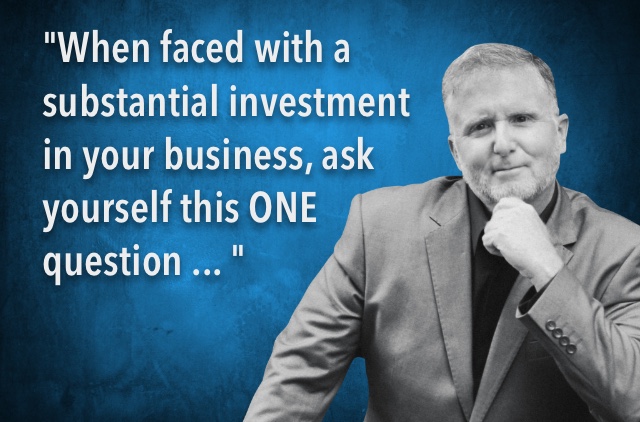
Have you ever gone on a business buying spree? And regretted it because you didn’t have the time to implement a third of what you purchased?
Or maybe you discovered – after you spent more than you wanted – it was going to take a lot longer to make it pay off?
Or have you ever done the opposite: Passed on an opportunity that could have changed the game for you?
Well there’s an interesting little trick I dreamed up, to help you get clear on which of those resources are a go … and which ones are a no.
Because face it:
Marketers are really good at making their offer seem like the one you must have.
But you may discover (too late) you don’t have the time or skills to make it pay off.
So if you’ve been looking for a way out of this dilemma once and for all:
Here’s the trick:
When faced with a substantial investment in your business, ask yourself:
1.
If I were to make this investment, AND
2.
I had to make back TWO TIMES the amount I spent in the following 6-9 months directly traceable to that investment.
3.
Or I would forfeit an additional amount equal to twice what I paid initially …
Would I still go ahead with it?
Too many entrepreneurs make an emotional decision to buy something, and then struggle to monetize it.
Or they invest in too much stuff, and don’t have the time to implement any of it.
Or they invest in it because its cool or inspirational, only to find coolness and inspiration doesn’t pay the bills.
Gaming out these three steps prevents you from stepping on any of these costly land mines, by forcing you to think about how to make the investment pay off BEFORE opening your wallet.
Getting specific is the magic bullet
.
Instead of hoping you’ll make it work out [ bad idea ] or getting caught up in the emotion of the moment, the SPECIFIC NATURE of the game (and the financially painful penalty of failure) makes you ask yourself:
Exactly how am I going to make this pay off?
You can adjust always adjust the details of the game (longer time to make it pay off / geting a 3x ROI instead of a 2x ROI) if that works best for the specific investment.
But playing the game with specific numbers helps you overcome one of the primary causes of entrepreneur crash-and-burn syndrome:
Having a wish it will all work out, instead of having a plan that makes it work out.
Having a plan you are confident will give you a 300% ROI within six months of investing also helps eliminate the fear of plowing a big chunk of change into your business.
Because if you are confident you’re going make it all back (and then some), you will find the money, even if you think you don’t have it.
There is one other way this pays off …
You can also use this to PRIORITIZE what you should invest in over the coming year.
Let’s say you’ve budgeted $15,000 to spend in the next year – on tools / coaching programs / courses / memberships – to grow your business.
If you had to make back TWO TIMES the amount you spent in 6-9 months directly traceable to that investment
Or you would have to forfeit twice what you paid …
What spending priorities would rise to the top?
Once again, by requiring you get a specific return on that investment in a specific time period, it narrows the scope of what you will invest in:
From something that would be nice, or cool, or interesting, or inspiring, or “something you want to learn”.
To something that will actually give you an ROI.
So you can see which possibilities are based on sound logic. And which ones you may need to re-think or toss all together.
So before you make any big investments in your business, do this exercise.
.
Because you shouldn’t have to guess whether or not something is a great investment.
You should have a really clear view not only on if you’re going to make it work out. But HOW you’re going to make it work out.
This isn’t about spending the money.
It’s about having a plan in place on how you’re going to make it back before you jump in.

Great advice, especially for those who may be panicking and looking for that instant solution to grow their business. Asking those questions puts everything in perspective, and brings more grounding to your decisions. Thanks Rob.
Yes, the instant solution impulse! Glad this was helpful, Cheryl.